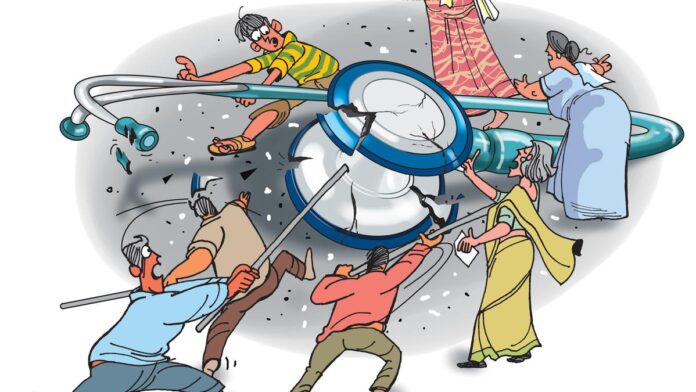The doctors can also refuse to treat patients if the agreed-upon fees are not paid in lieu of treatment
Doctors can now refuse treatment to the unruly and violent patients and in such cases, the doctors have been told to follow a procedure of properly documenting and reporting the said violence, their refusal and referral of the patient to other health facilities, noted the National Medical Commission’s (NMC) gazette notification, which notified the NMC Registered Medical Practitioner (Professional Conduct) Regulations 2023.
These regulations prescribe a code of ethics mandatorily to be adopted by every practitioner of modern medicine who is registered under the NMC Act and is practising in the country.
The National Medical Commission Registered Medical Practitioner RMP (Professional Conduct) Regulations, 2023 will replace the Medical Council of India’s (MCI) Code of Medical Ethics 2002. These new regulations have been enforceable since August 2, 2023, the date of their publication in the official gazette.
The notification states
that in case of abusive, unruly, and violent patients or relatives, the RMP can document and report the behaviour and refuse to treat the patient. Such patients should be referred for further treatment elsewhere.
Right to choose
Doctors can now refuse treatment to the unruly and violent patients and in such cases, the doctors have been told to follow a procedure of properly documenting and reporting the said violence, their refusal and referral of the patient to other health facilities, noted the National Medical Commission’s (NMC) gazette notification, which notified the NMC Registered Medical Practitioner (Professional Conduct) Regulations 2023.
These regulations prescribe a code of ethics mandatorily to be adopted by every practitioner of modern medicine who is registered under the NMC Act and is practising in the country.
The National Medical Commission Registered Medical Practitioner RMP (Professional Conduct) Regulations, 2023 will replace the Medical Council of India’s (MCI) Code of Medical Ethics 2002. These new regulations have been enforceable since August 2, 2023, the date of their publication in the official gazette.
The notification states that in case of abusive, unruly, and violent patients or relatives, the RMP can document and report the behaviour and refuse to treat the patient. Such patients should be referred for further treatment elsewhere.
Right to choose
The regulations also give the doctors the right to choose whom they will serve, except in case of a life-threatening emergency.
The ‘Patient Care’ section in the document states that — “RMP is free to choose whom he will serve, except in case of a life-threatening emergency. Having accepted a case, the RMP should neither neglect the patient nor withdraw from the case without giving adequate notice to the patient and his family. If a change of RMP is needed [for example, the patient needs a procedure done by another RMP], consent should be obtained from the patient himself or the guardian. The RMP who attends to the patient will be fully accountable for his actions and entitled to the appropriate fees. In case of abusive, unruly, and violent patients or relatives, the RMP can document and report the behaviour and refuse to treat the patient. Such patients should be referred for further treatment elsewhere.”
Moreover, the doctors can also refuse to treat patients if the agreed-upon fees are not paid in lieu of treatment. This said provision, however, will not be applicable to government doctors or in case of emergencies.
Additionally, consultation fees should be made known to the patient before examination or treatment of the patient. A reasonable estimation of the cost of surgery or treatment should be provided to the patient to enable an informed decision.
It adds that RMP can refuse to treat or to continue to treat a patient if the fees, as indicated, are not paid. At the same time this does not apply to doctors in government service or emergencies but the doctor must ensure that the patient is not abandoned.
Any violation of these regulations is bound to attract strict disciplinary action in the form of a suspension of the licence to practice for a period ranging from 3 months to 3 years, states the notification.


